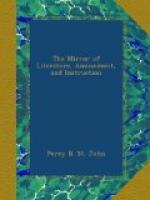When Captain Parry found that the men could not support their toils on the allowance, (of about nineteen ounces per twenty-four hours, of pemecan and biscuit-powder.) he added, by way of luxury, a pint of hot water at night. This was found to be very restorative, warming the system; and if a little of the dinner food had been saved, it made a broth of great relish and value. Spirits were not drank; and the reason why even hot water was scarce, was, that it took so large a stock of their spirits of wine to boil it and the cocoa, that the quantity consumed could not safely be increased.
The ice itself was drifting faster to the south than they could make their way over it to the north: thus, during the last three days of their struggle, instead of gaining a higher latitude, they were actually two miles farther south than when they set out. This put an end to the expedition where everything which human energy and perseverance could do, was done so fruitlessly.
While the boats were away, the Hecla was not exempt from dangers. She had been wrought into a snug birth near the shore. A-head there were about three miles of ice; and a heavy gale coming on, detached this prodigious mass, and drove it with terrible violence against the ship. The cables were cut asunder, the anchors lost, and the poor Hecla forced high and dry upon the coast, by the irresistible pressure. Having got her again to the water, however, they proceeded to Weygatt Straits.
It is vexatious to be forced to the conviction that any attempt to reach the North Pole is but too likely to end in disappointment; but every fresh enterprise seems to lead to this conclusion.




